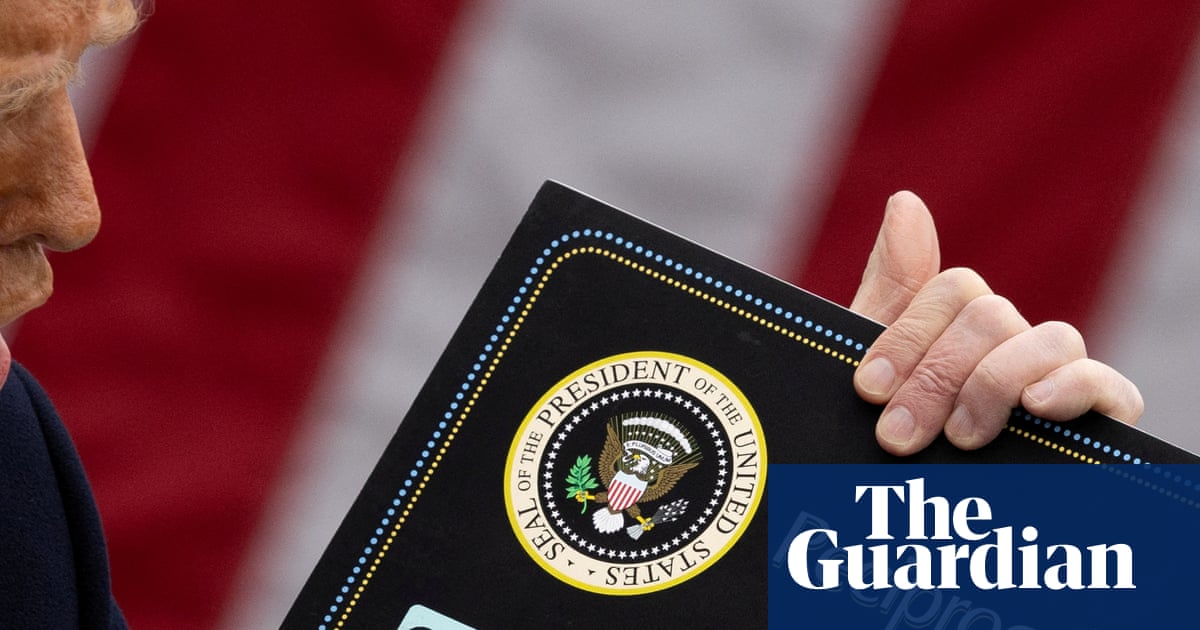Speaking at a Christian museum on Monday, Donald Trump claimed, falsely, that his deployment of national guard troops to invade the nation’s capital has eliminated crime in Washington. He complained, however, that domestic violence was being counted in the crime statistics, which he claimed meant that the influence of his policy was not being seen as significant enough. “They said, ‘Crime’s down 87%,’” the president claimed, not explaining who “they” were. “I said, no, no, no. It’s more than 87%, virtually nothing. And much lesser things, things that take place in the home they call crime. You know, they’ll do anything they can to find something. If a man has a little fight with the wife, they say this was a crime. See? So now I can’t claim 100%, but we are. We are a safe city.”
If Trump wanted to endorse domestic violence decriminalization, he may take some comfort in the status quo: as it is, about 24% of adult American women have been the victims of “severe physical violence” by an intimate partner, according to the National Domestic Violence Hotline; the Centers for Disease Control, meanwhile, puts the proportion of women who have experienced “contact sexual violence, physical violence, or stalking by an intimate partner” at 41%. and many of those incidents are not reported or not prosecuted – meaning that the perpetrators are free, and that their assaults have not been treated as fully “criminal”.
The Trump administration, meanwhile, has been working to make sure that victims of domestic violence have even fewer resources and even scanter opportunities to escape their abusers. The Trump administration has moved to drastically cut federal grants to domestic violence non-profits, which rely heavily on the federal government for funding. The administration has further sought to freeze funding to domestic violence charities that serve trans women victims and participate in diversity, equity and inclusion programming, severely hampering the work of groups that seek to serve marginalized victims from LGBTQ+ or racial minority populations, or to frame domestic violence as a gender justice issue. The administration has also moved to condition domestic violence funding on charities’ willingness to hand over abused women to Ice, a move that would severely limit the ability of undocumented victims to seek help.
Trump’s complaint that private violence enacted by men against women in the home should not be considered criminal is of a piece with old and long-abandoned misogynist legal understandings of women’s status, the nature of marriage, and men’s prerogatives in the home, which dictated that women had no rights in the private sphere that their husbands or fathers needed to respect, and that men could enforce their dominance and control over women in private with violence.
This notion – that gender, family and sexual relations are private matters that the law has nothing to say about, and that the state has no duty to defend the rights and safety of its women citizens from the violence of its male ones – was dismantled over the long course of the 20th century by feminist legal activists that worked to criminalize domestic battery, establish a woman’s right to sexual refusal, and build institutions that would provide material resources and physical opportunities for women to leave the homes where they were being abused.
But Trump’s interpretation of the law has a long history, too. The 17th-century English jurist Matthew Hale, who was cited approvingly by Justice Samuel Alito in the Dobbs decision, articulated the view of men’s prerogatives in the law when he wrote that the rape of a wife by her husband was not illegal, because: “The husband cannot be guilty of a rape committed by himself upon his lawful wife, for by their mutual matrimonial consent and contract the wife hath given up herself in this kind unto her husband, which she cannot retract.” Hale’s vision of marriage as endowing a man with a right to inflict violence on his wife in private – a quasi-proprietary relationship in which a woman’s initial consent to marriage eliminated any subsequent claims she may have had to her own rights, property or body – is one of total mastery. “I do” is translated into a permanent, irrevocable and horrifyingly inclusive “he can”.
It is not surprising that Trump thinks that men’s domestic violence against women should not be a crime. This is the man who once boasted that he liked to “grab ’em by the pussy”; the man who has been accused of sexual misconduct by more than two dozen women; who was accused of rape by his first wife (who later rescinded her accusation) and by the writer E Jean Carroll, whose sizable judgment against Trump was upheld by a court on the same day that he gave his remarks. This is the man who is alleged to have barged in on young beauty pageant contestants as they changed, and whose letter to the pedophile financier Jeffrey Epstein, extolling the “wonderful secret” that the two shared, was made public on Monday as well, complete with a drawing of a nude female form.
What might be more surprising is how closely Trump’s view of the prerogatives and entitlements of abusive husbands towards their abused wives mirror his own sense of his prerogatives and entitlements as president towards his abused country. Throughout his second term, Trump has spoken of the 2024 election in terms similar to the way that Hale spoke of the marriage vow: as an irrevocable grant of total power. He believes, he says, that because he won the 2024 election, that there are now no more rights that Americans have that he must respect: that he can discard the will of Congress, fire civil servants at will, kidnap our neighbors and invade our cities.
These are not the gestures of a leader who respects his people and seeks to serve them, just as Hale’s vision of marriage is not one in which a husband respects his wife as an equal and seeks to love her. The model is not of partnership, but of domination. This time, it is America herself who is taking the beating.
-
Moira Donegan is a Guardian US columnist

 German (DE)
German (DE)  English (US)
English (US)  Spanish (ES)
Spanish (ES)  French (FR)
French (FR)  Hindi (IN)
Hindi (IN)  Italian (IT)
Italian (IT)  Russian (RU)
Russian (RU)  6 hours ago
6 hours ago
























Comments